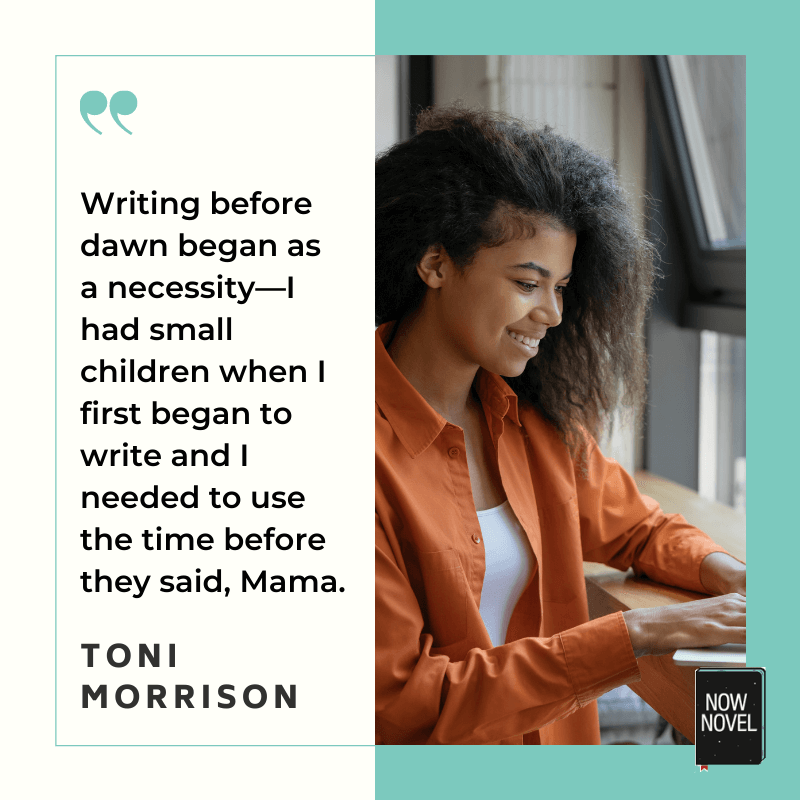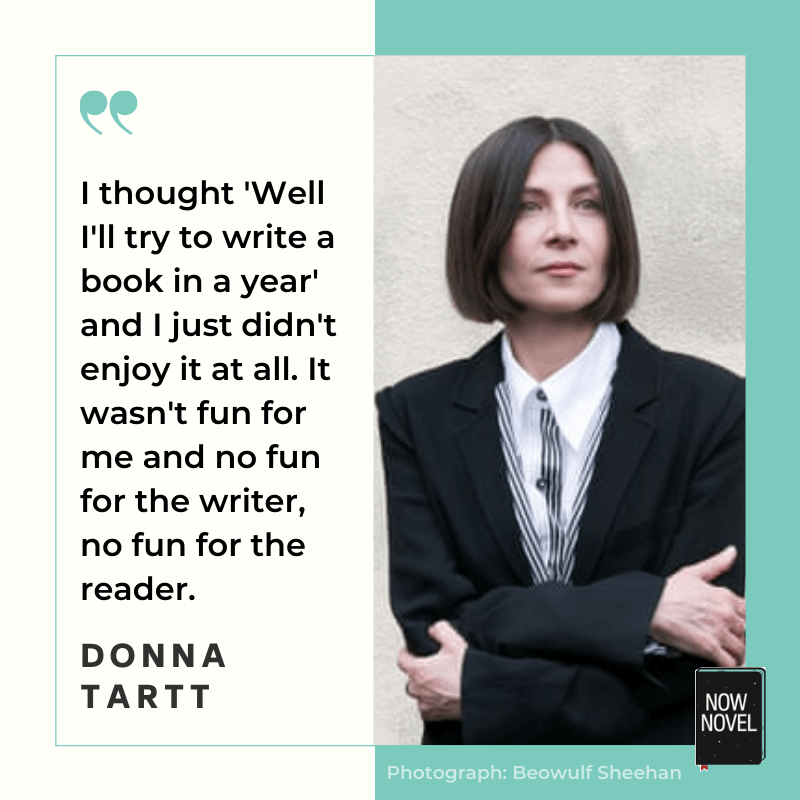Having a good writing schedule is crucial for finishing. Here are 10 ways to get into a better writing routine:
Writing schedule hacks to make time:
- Get accountable
- Stack good habits
- Stop mid-sentence
- Don’t find time – make it
- Be an opportunist
- Write daily
- Find a fragment that excites you
- Write throwaway pages
- Read to keep circuits open
- Make writing schedules fun
1. Get accountable
Accountability is key for keeping to a writing schedule. Whether you’re accountable to a calendar or (even better) a person.
There are coaches for dietary changes, mindfulness, professional development. Writing coaches and groups help us because accountability facillitates:
- Focus
- Commitment
- Purpose
- Positive change
- Support
The member-created ‘Draft Writing Daily Streak Counters Accountability’ group on Now Novel is an example of an accountability aid.
Having somewhere – and someone – to share, note and affirm your progress helps.
Joan Didion described how she already had full notes for Play it As it Lays and a discussion with her editor provided the extra alignment and accountability to pull it all into shape:
I never know quite what I’m doing when I’m writing a novel, and the actual line of it doesn’t emerge until I’m finishing. Before I ran it through again I showed it to John and then I sent it to Henry Robbins, who was my editor then at Farrar, Straus. It was quite rough, with places marked “chapter to come.” Henry was unalarmed by my working that way, and he and John and I sat down one night in New York and talked, for about an hour before dinner, about what it needed doing. We all knew what it needed. We all agreed. After that I took a couple of weeks and ran it through.
Joan Didion, in ‘The Art of Fiction No. 71’, available here.
A manuscript evaluation functions much the same way as Didion’s pre-dinner chat.
2. Stack good habits
Writing is a thinking cap you want to wear every day. A habit you have already is the peg to hang it on. You’ll know where to find your daily motivation.
Attaching your writing routine to something you do by default is a great way to keep your writing resolutions.
The habit you attach writing to could be something as mundane as:
- Making a morning cup of tea or coffee
- Checking your emails before bed
- Waiting while supper/dinner is in the oven
Ilene Berns-Dare, writing for Psychology Today, calls this ‘habit-stacking’. The example she gives is the resolution ‘After I brush my teeth, I will sit down and breathe mindfully for two minutes.’
Link a non-negotiable goal – writing your stories – with already non-negotiable actions.
Author Haruki Murakami describes daily habits surrounding his early-rising writing schedule:
I get up at four a.m. and work for five to six hours. In the afternoon, I run for ten kilometers or swim for fifteen hundred meters (or do both), then I read a bit and listen to some music. I go to bed at nine p.m.
I keep to this routine every day without variation.
Haruki Murakami, in ‘The Art of Fiction No. 182’, quoted by James Clear here.
What do you do every day without variation?
3. Stop mid-sentence
A writing schedule is far easier to keep to when you’re motivated.
Having an easy win, something quick to finish at the start of a writing session, is a helpful hack.
Legend has it that Ernest Hemingway would stop a writing session mid-sentence, leaving something immediate to finish when he next sat down.
Whether or not Hemingway did do this is irrelevant. A Now Novel member doing NaNoWriMo mentioned trying this and described the delight of having an easy win to score, every day.

4. Don’t find time – make it
A writing schedule like Murakami’s – writing all morning, swimming all afternoon – is all very well if you don’t have to do other work, or mind and/or homeshcool children (during a pandemic or for other reasons).
One of the more common reasons members give for cancelling subscription on Now Novel is ‘I don’t have time but I’ll be back’.
Finding time for your writing is really making time – a process of prioritizing. You don’t have to get back to writing, then. It comes back to you.
The great Toni Morrison describes how waking early to make time began as a parent’s necessity:
Writing before dawn began as a necessity—I had small children when I first began to write and I needed to use the time before they said, Mama—and that was always around five in the morning.
Toni Morrison, in ‘The Art of Fiction No. 134’, available here.
5. Be an opportunist
Developing your writing schedule means becoming an opportunist, like the early-rising icon, Mrs Morrison.
Setting your alarm that initially painful 45 minutes earlier is one way to go.
Yet use every opportunity. You could keep a notebook in a bag at hand and draft longhand or take notes as you:
- Wait for an appointment with a doctor, dentist or hairdresser
- Park to fetch a child when you do a school run
- Stand in line (at the supermarket, to vote, or for any other reason)
NYT bestseller George Saunders describes building a writing schedule around opportunity in a far riskier way:
My first book was written actually at work and I had this whole drill – my desk was as far away from the door as I could get it and I put a story up on one screen and then my work on the other, and I even had a series of postural adjustments so I’d be writing with excitement and if somebody walked in I’d hit ‘shift F3’ and kind of look as depressed as I could so they’d think I was working.
George Saunders, interview with Writers & Artists: The Insider Guide to the Media here.
Stopping short of risky (and ethically dubious) choices like this, use every opportunity to add to your schedule and use time that you might otherwise waste.
6. Write daily
Repetition and frequency are key to building a good habit.
Stephen King describes how he used to listen to busy music to achieve a good pace in writing daily, including a dance mix of Lou Bega’s Mambo No. 5 he’d listen to on repeat in the background (until his wife threatened murder).
In the same interview, King stresses that daily practice is most important:
But even more than place, I think it’s important to try to work every day that you possibly can
Stephen King, in ‘The Art of Fiction No. 189
7. Find a fragment that excites you
It’s easy to build a regular writing schedule around what excites you.
You could, for example, come up with 5 summary paragraph ideas by repeating the process in the Now Novel ‘Central Idea’ prompts. Then try to write a paragraph following on from each one.
Next, ask which idea excited you the most to continue. Chances are you’ve found a problem to solve that will keep you intrigued.
George Saunders describes building a process out of this early stage of idea-finding:
I think it’s a little bit like in biology, that idea of a seed crystal. You start with the smallest little thing and then by reworking it, it will grow outward very organically. You don’t have to worry too much about ideas at the beginning, but you have to find some little fragment that excites you for a reason that you can’t explain.
Saunders, interview for Writers & Artists
8. Write throwaway pages
It’s easy to commit to a writing schedule once you accept not every page will make your final draft.
Instead, commit to churning out ideas, notes, and scenes. Some will be bad, some mediocre, and some could make it to your final draft, barely edited.
Barbara Kingsolver, interviewed by Noah Charney, once said:
I write a lot of material that I know I’ll throw away. It’s just part of the process. I have to write hundreds of pages before I get to page one.
Barbara Kingsolver, interviewed by Noah Charney for The Daily Beast.
Not being precious about what you write gives you the freedom to produce, generating enough to find page 1.

9. Read to keep circuits open
Making reading part of a writing schedule may sound counterintuitive.
Yet, as Philip Roth says, reading often as part of your writing habit helps to ‘keep circuits open’.
Reading others’ stories helps you subconsciously find ways to troubleshoot your own.
I read all the time when I’m working, usually at night. It’s a way of keeping the circuits open. It’s a way of thinking about my line of work while getting a little rest from the work at hand. It helps inasmuch as it fuels the overall obsession.
Philip Roth, interviewed by Hermione Lee in The Art of Fiction No. 84
10. Make writing schedules fun
It’s important, however you finesse your process, to keep it fun. If it takes you 10 years per book (as it has taken Donna Tartt to write her ambitious novels), and you have the time to take longer, make notes, do research – this is fine too. Your writing schedule, your tempo.
I’ve tried to speed up. It was a mistake. I thought ‘Well I’ll try to write a book in a year’ and I just didn’t enjoy it at all. It wasn’t fun for me and no fun for the writer, no fun for the reader.
A writing coach will help you develop a writing schedule that works for you.

